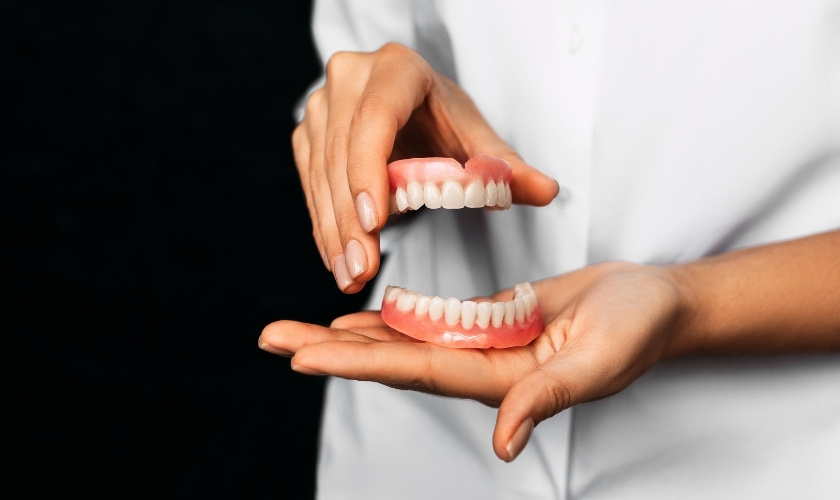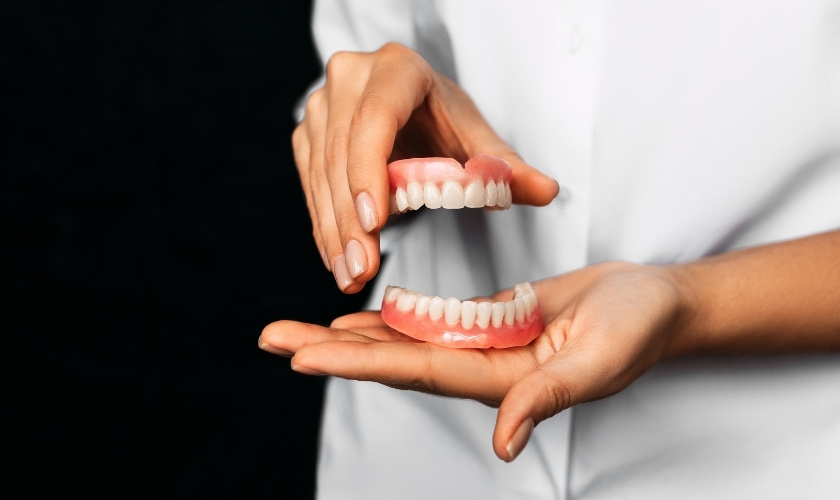$29 Emergency Exam - Walk-Ins Welcome - Same-Day Dental Appointments Available

Learning to manage immediate dentures can be challenging for beginners. However, with the right approach and tips, the process becomes more straightforward and manageable. Let’s explore some expert tips that will help you remove your dentures with ease and confidence.
Preparing for Denture Removal
Set Up a Comfortable Space
Before attempting to remove your dentures, create a comfortable and clean space. Choose a well-lit area with a mirror to see what you’re doing. Have all necessary supplies nearby, such as a glass of water, a towel, and a storage case for your dentures. This setup ensures you don’t have to search for items midway, making the process smoother and stress-free.
Wash Your Hands
Hygiene is crucial when handling artificial teeth. Wash your hands thoroughly with soap and water before you begin. Clean hands help prevent introducing bacteria into your mouth and onto your artificial teeth, reducing the risk of infections or complications.
Relax Your Jaw Muscles
Relaxation is key. Take a few deep breaths to relax your jaw muscles before removing your dentures. Tension can make the removal process more difficult and uncomfortable. A calm, relaxed jaw allows for easier manipulation of the artificial teeth, making the process smoother.
Step-by-Step Guide to Removing Immediate Dentures
Use Lukewarm Water
Start by rinsing your mouth with lukewarm water. Lukewarm water helps to loosen the adhesive that may be holding your false teeth in place. Swish it around gently to ensure it reaches all areas around the dentures. This simple step can make a significant difference in ease of removal.
Gently Loosen the Artificial Teeth
Using your thumb and forefinger, gently rock the artificial teeth back and forth. This rocking motion helps break the suction and loosens the dentures. Begin at the front and gradually move to the sides. Take your time to avoid causing discomfort or damage to your gums.
Remove the Upper Denture
For the upper denture, place your thumb against the front teeth and your index finger on the roof of your mouth. Gently push upwards and outwards, avoiding any sudden or forceful movements. The upper denture should come loose with minimal effort.
Remove the Lower Denture
Removing the lower denture involves a slightly different approach. Place your thumb and index finger on either side of the denture and gently pull upwards. The lower denture typically requires less force due to gravity assisting in its removal.
Cleaning and Storing Your Dentures
Rinse Your Artificial Teeth Immediately
After removal, rinse your artificial teeth under lukewarm water to remove any debris or adhesive residue. Use a soft brush designed for dentures to clean them thoroughly. Avoid using hot water as it can warp the denture material, affecting the fit and comfort.
Brush Your Artificial Teeth Daily
Brushing your artificial teeth daily is essential for maintaining their cleanliness and longevity. Use a non-abrasive artificial teeth cleaner and a soft-bristled brush. Regular brushing prevents plaque buildup, staining, and potential odors, ensuring your dentures remain fresh and hygienic.
Soak Your Dentures Overnight
Soaking your dentures overnight in a denture solution helps keep them moist and sanitized. Follow the manufacturer’s instructions for the appropriate soaking solution. This practice prevents the dentures from drying out and maintains their shape and fit.
Store Properly
When not wearing them, keep your dentures in a clean, dry case. Ensure the case is placed in a safe location to prevent damage or loss. Proper storage helps protect your dentures from bacteria and physical damage, extending their lifespan.
Tips for Managing Denture Adhesive
Use Adhesive Sparingly
If you use denture adhesive, apply it sparingly. A small amount goes a long way in providing a secure fit. Excessive adhesive can make removal more challenging and leave residue on your gums and dentures.
Clean Adhesive Residue
After removing your artificial teeth, clean any adhesive residue from your gums. Use a soft cloth or gauze pad soaked in warm water to gently wipe away the adhesive. Keeping your gums clean ensures comfort and prevents irritation or sores.
Adjusting to Denture Removal
Practice Regularly
Like any new skill, practice makes perfect. Regular practice helps you become more comfortable and proficient at removing your dentures. Over time, you’ll develop a routine that works best for you, making the process feel natural and easy.
Address Discomfort
Some discomfort is normal when you first start removing your dentures. However, persistent pain or sores should not be ignored. If you experience significant discomfort, consult your Fort Worth dentist for advice. They can provide adjustments or recommendations to improve your comfort.
Communicate with Your Dentist
Maintain open communication with your dentist about your artificial teeth experience. They can offer valuable insights and adjustments to ensure your dentures fit well and are easy to manage.
Understanding the Learning Curve
Be Patient
Adapting to dentures takes time. Be patient with yourself as you learn to remove and care for them. Everyone’s experience is different, and it’s normal to encounter challenges. Consistency and patience will lead to successful denture management.
Seek Support
Sharing your experiences and hearing from others can provide encouragement and practical tips. Support networks offer a sense of community and reassurance during your adjustment period.
FAQs
How often should I remove my dentures?
Remove your dentures daily for cleaning and to allow your gums to rest. Nighttime removal is recommended to give your gums a break and maintain oral health. Regular removal ensures both your dentures and gums remain in good condition.
Can I sleep with my dentures in?
While some may choose to sleep with their artificial teeth, it’s generally recommended to remove them. Removing dentures at night promotes better gum health and allows for thorough cleaning.
What should I do if my dentures are difficult to remove?
If you find it difficult to remove your artificial teeth, consult your dentist. They can provide guidance on proper techniques or adjust the fit if necessary. Difficulty in removal could indicate an issue that needs professional attention.
For those seeking quality care, dentures in Fort Worth offer reliable solutions and expert advice for managing your dentures with ease. By following these tips, you’ll navigate the learning curve smoothly and enjoy the benefits of a comfortable, well-fitting denture.


